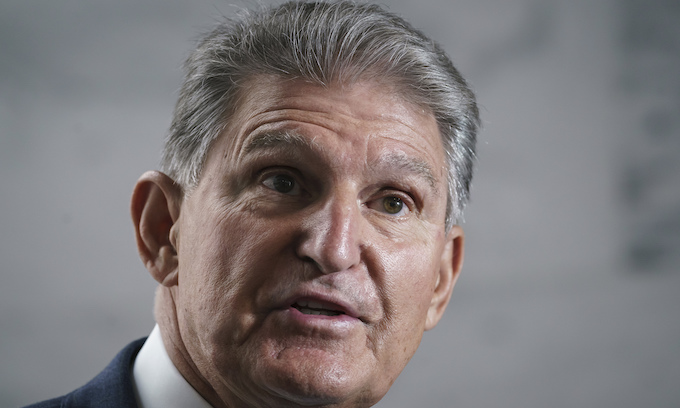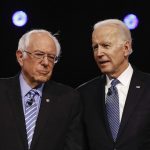Washington — Sen. Joe Manchin of West Virginia asked Senate leadership on Tuesday to remove his permitting reform bill from funding legislation that must pass before the end of the week after failing to rally support from enough of his peers in either party.
The coal state Democrat struck a deal with Senate Majority Leader Chuck Schumer, D-New York, to attach his proposal — which would accelerate federal permitting for both clean energy and fossil fuel projects — to a stop-gap government funding measure that must be passed by the end of the month to prevent a government shutdown. In exchange, Manchin voted to support Democrats’ tax and spending measure, the Inflation Reduction Act.
It became known as the “dirty deal” among environmental groups and other critics, including members of his own party who feared it would sidestep environmental reviews. Republicans, too, didn’t offer widespread support despite their interest in permitting changes, arguing his proposal doesn’t go far enough.
But both sides were also animated by frustration with Manchin’s approach to Democrats’ spending bill, which Manchin called “revenge politics.”
“It is unfortunate that members of the United States Senate are allowing politics to put the energy security of our nation at risk,” Manchin said in a statement.
He indicated that he didn’t have enough support to clear a 60-vote threshold to pass legislation through the Senate, and said “a failed vote on something as critical as comprehensive permitting reform” would embolden people like Russian President Vladimir Putin, who has used energy as a political cudgel in his country’s war with Ukraine.
“For that reason and my firmly held belief that we should never come to the brink of a government shutdown over politics, I have asked Majority Leader Schumer to remove the permitting language from the Continuing Resolution we will vote on this evening,” he said, referring to a planned initial vote Tuesday ahead of final passage.
The legislation will be de-coupled from the crucial funding bill, though analysts expect it stands little chance of passing without the pressure of a government shutdown looming.
“I stand ready to work with my colleagues to move forward on this critical legislation to meet the challenges of delivering affordable reliable energy Americans desperately need,” Manchin said. “We should never depend on other countries to supply the energy we need when we can produce it here at home.”
Manchin’s bill would require the White House to designate energy projects of “strategic national importance” and prioritize permitting for those projects, which must include critical mineral and energy transmission projects as well as carbon capture and hydrogen. However, at least some of those chosen would also have to be fossil fuel projects.
It would also set a two-year limit for project reviews under the National Environmental Policy Act, set a 150-day statute of limitations for lawsuits challenging projects, and expedite approval of the Mountain Valley Pipeline, a natural gas line running from West Virginia to Virginia.
The legislation would have been attached to a continuing resolution, which would extend current government funding levels past Sept. 30, when the fiscal year ends. The government cannot remain open unless Congress passes the bill.
The legislation touched on a topic of increasing importance to global automakers, who are concerned about supplies of critical minerals for electric vehicle batteries that are in short supply worldwide.
Forecasters estimate both the world and the United States will fail to meet demand for EV battery minerals such as lithium, cobalt, nickel and graphite by steep margins in the coming decade. The mineral supply chains that do exist for EV batteries globally are largely controlled by China, the country’s chief economic rival.
Streamlining permitting for energy projects has long been on the wish list for mining companies, which argue there is a long and convoluted permitting process that makes it difficult for miners to invest in extracting the critical minerals needed to fuel an electric vehicle boom.
It takes an estimated seven to 10 years to permit a mine in the United States. And “even once you get your permit, you often get hit with lawsuits,” said Abigail Wulf, director of critical minerals strategy at Securing America’s Future Energy, which supports Manchin’s proposal.
Some clean energy advocates lined up in support of the legislation in the hopes it would accelerate low-emission energy projects eligible for newly-available funding, including the American Clean Power Association, the American Council on Renewable Energy, and Energy Secretary Jennifer Granholm.
Michigan Reps. Rashida Tlaib, D-Detroit, Andy Levin, D-Bloomfield Township, and Debbie Dingell, D-Ann Arbor, were among the House members who signed a letter to leadership opposing the bill, fearing it violated the National Environmental Policy Act. Sen. Debbie Stabenow, D-Lansing, also told The News she had “deep concerns” about the legislation.
___
(c)2022 The Detroit News
Visit The Detroit News at www.detnews.com
Distributed by Tribune Content Agency, LLC.
—-
This content is published through a licensing agreement with Acquire Media using its NewsEdge technology.



















This can happen to media darlings. Best to pick your side and stick to it lest you find yourself the whipping boy for all sides including the voters.
Serves his cowardly traitorous butt RIGHT.